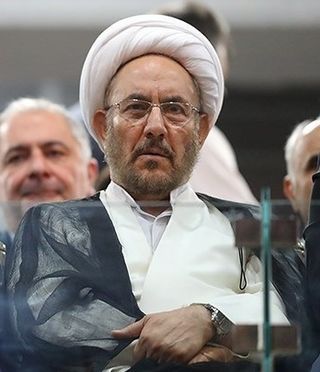
Sayyid Kamal Kharazi is an Iranian reformist politician and diplomat who was the Minister of Foreign Affairs from 20 August 1997 to 24 August 2005 as appointed by President Mohammad Khatami serving for eight years. He was replaced by Manouchehr Mottaki who was appointed by the next President Mahmoud Ahmadinejad. He is currently member of the Expediency Discernment Council.

Ebrahim Yazdi was an Iranian politician, pharmacist, and diplomat who served as deputy prime minister and minister of foreign affairs in the interim government of Mehdi Bazargan, until his resignation in November 1979, in protest at the Iran hostage crisis. From 1995 until 2017, he headed the Freedom Movement of Iran. Yazdi was also a trained cancer researcher.

Mohammad Reyshahri, also known as Mohammad Mohammadi-Nik, was an Iranian politician, cleric, judge and religious scholar, who notably served as Chief Judge of the Revolutionary Military Tribunal (1979–1984), as the first Minister of Intelligence and Security (1984–1989) in the cabinet of Prime Minister Mir-Hossein Mousavi and as Prosecutor-General of Iran from 1989 to 1991.
Presidential elections were held in Iran on 23 May 1997, which resulted in an unpredicted win for the reformist candidate Mohammad Khatami. The election was notable not only for the lopsided majority of the winner - 70% - but for the high turnout. 80% of those eligible to vote did so, compared to 50% in the previous presidential election.
Presidential elections were held in Iran on 24 July 1981 after the previous Iranian president, Abolhassan Banisadr, was impeached by the Majlis on 21 June and then sacked by the Supreme Leader, Ayatollah Khomeini, on 22 June. The elections occurred after the Hafte Tir bombing, which killed Mohammad Beheshti and dozens of other Iranian officials on 28 June 1981. This led to the election of Mohammad Ali Rajai, the previous prime minister, winning 13,001,761 votes out of the 14,573,803 votes cast, which was 89% of the votes. The vote turnout was 65.29%.

The Executives of Construction of Iran Party is a reformist political party in Iran, founded by 16 members of the cabinet of the then President Akbar Hashemi Rafsanjani in 1996. The party is a member of Council for Coordinating the Reforms Front.

Ali Younesi is an Iranian politician, who served in different positions.

Kian Tajbakhsh is an Iranian-American scholar, social scientist, and urban planner. He has taught at both American and Iranian universities. Tajbakhsh is an international expert in the areas of local government reform, urban planning, civil society capacity building, and international public policy research collaboration. He has also directed international projects in the areas of public health and social policy.
Ali Shakeri is an Iranian-American businessman and activist. He graduated from the University of Texas with a business administration degree. He serves on the Community Advisory Board of the Center for Citizen Peacebuilding at the University of California, Irvine. Shakeri was one of four dual-nationality Iranian-Americans detained by the Iranian government in May 2007.

The Freedom Movement of Iran (FMI) or Liberation Movement of Iran is an Iranian pro-democracy political organization founded in 1961, by members describing themselves as "Muslims, Iranians, Constitutionalists and Mossadeghists". It is the oldest party still active in Iran and has been described as a "semi-opposition" or "loyal opposition" party. It has also been described as a "religious nationalist party".
The Council of Nationalist-Religious Activists of Iran or The Coalition of National-Religious Forces of Iran is an Iranian political group, described as "nonviolent, religious semi-opposition" with a following of mainly middle class, intellectual, representatives of technical professions, students and technocrats.

The Islamic Coalition Party is a conservative political party in Iran that favors economic liberalism.
The Movement of Militant Muslims is an Iranian Islamic socialist political group led by Habibollah Payman. The group had been revolutionary and is close to Council of Nationalist-Religious Activists of Iran.
Politics in the Islamic Republic of Iran are dictated by factionalism. All political parties were banned in the Islamic Republic in 1987. Today, several political factions encapsulate the political landscape in the Persian country, and scholars such as Maziar Behrooz, Behzad Nabavi, Bahman Baktiari, Maaike Warnaar, Payam Mohseni, have given different formulations of them, varying in number and orientation.
The Hezbollah Assembly or Assembly of Hezbollah was a parliamentary group in the Iranian Parliament between 1996 and 2000.
The Hezbollah fraction was the conservative parliamentary group in the Iranian Parliament between 1996 and 2000.
Independent Hezbollah deputies was a parliamentary group in the Iranian Parliament between 1996 and 2000.

Mojahed is the official newspaper of the People's Mujahedin of Iran (MEK), first printed in 1979 on a weekly basis. The newspaper published its last issue inside Iran on 30 June 1981 and after a hiatus resumed publication in exile on 2 December 1982.

Iran-e Farda is an Iranian nationalist-religious periodical publication printed in magazine-format and published digitally that focuses on current sociopolitical affairs of Iran.
The Religious–Nationalists or the National–Religious are terms referring to a political faction in Iran that consists of individuals and groups embracing Iranian nationalism and Islam, as an integral part of their manifesto. They self-identify as political followers of Mohammad Mosaddegh and their modernist religious outlook makes them advocates of coexistence of Islam and democracy, an idea distinguishable from those of ideologies such as Pan-Islamism or Islamism.









